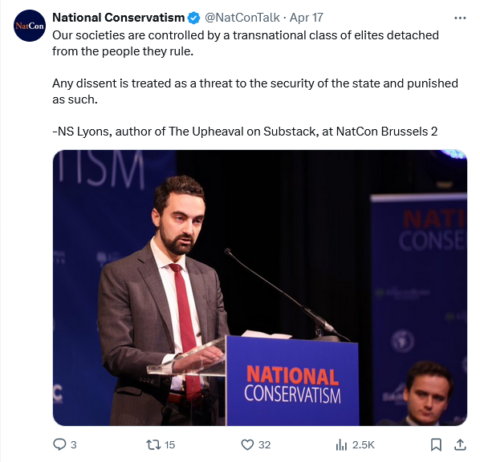Every now and again, it’s worth thinking about what the intersectional left’s ultimate endgame really is — and here it strikes me as both useful and fair to extrapolate from Kendi’s project. They seem not to genuinely believe in liberalism, liberal democracy, or persuasion. They have no clear foundational devotion to individual rights or freedom of speech. Rather, the ultimate aim seems to be running the entire country by fiat to purge it of racism (and every other intersectional “-ism” and “-phobia”, while they’re at it). And they demand “disciplinary tools” by unelected bodies to enforce “a radical reorientation of our consciousness”. There is a word for this kind of politics and this kind of theory when it is fully and completely realized, and it is totalitarian.
Andrew Sullivan, “A Glimpse at the Intersectional Left’s Political Endgame”, New York Magazine, 2019-11-15.
May 5, 2024
QotD: The aims of the intersectional left
May 4, 2024
Bill Blair – “I couldn’t make a defence policy argument to meet that spreadsheet target of two per cent”
I don’t find it at all surprising that Canada’s current Minister of National Defence hasn’t been able to persuade Justin Trudeau and the rest of cabinet that we should live up to our treaty commitments to our NATO allies. I do find it surprising that he’s allowed to say anything on the topic that implies criticism of Justin’s tame ministers:
This week, Defence Minister Bill Blair made a rare admission for a federal cabinet minister: He said he keeps trying to get the rest of cabinet to fund the Canadian military to NATO standards, but nobody’s biting.
“Don’t get me wrong. It’s important, but it was really hard (to) convince people that that was a worthy goal,” Blair said in a Wednesday address to the Canadian Global Affairs Institute, a foreign affairs think tank.
Blair was speaking specifically about boosting Canadian defence spending to the NATO standard of two per cent of GDP, which he referred to as a “magical threshold”.
“Nobody knows what that means, they didn’t know how much that is and they didn’t know what we were going to spend money on, so I couldn’t make a defence policy argument to meet that spreadsheet target of two per cent,” he said.
Only a few years ago, it was pretty typical for NATO members to fall well short of the two-per-cent threshold. In 2018, for instance, Canada spending 1.23 per cent of GDP on defence put it roughly on par with Germany, The Netherlands and Portugal, among others.
But Russia’s all-out invasion of Ukraine in 2022 sparked a massive defence-spending boost among the alliance. Germany, most notably, greenlit a massive rearmament plan with the specific goal of hitting the NATO threshold.
According to a 2023 report by the NATO Secretary General, Canada is the only member of the alliance to fail on both spending metrics tracked by the organization: The two-per-cent threshold, and the requirement that at least one-fifth of the defence budget be spent on equipment.
This is a perennial sticking point in Canada’s NATO membership. In February, both NATO Sec.-Gen. Jens Stoltenberg and U.S. ambassador to Canada David Cohen publicly chastised Canada for failing to deliver on its military commitments. Years earlier, U.S. president Donald Trump said Canada was “slightly delinquent” when it came to its NATO funding.
QotD: Why Donald Trump beat Hillary Clinton
Eight years ago, with the American election reaching fever pitch, no one truly believed that Donald Trump would defeat Hillary Clinton. I certainly didn’t. But then the Clinton team decided to publish her playlist –
(I’m embarrassed just to type that). In one flash, I knew that Trump would win. Not because Clinton’s playlist was lame, obvious, safe, uninspiring … I’m not judging her taste in music, or lack thereof, nor would I count myself qualified to do so. I knew instantly she would lose because it was so clear that no one on earth would ever want to see her playlist. Let alone listen to it. No one on earth would want to know that such a playlist existed, much less care a raspberry fuck what was in it, what genre, what generation, what anything. For all the negative feelings I may have entertained concerning Trump’s personality, moral and ethical nature, honesty, decency etc., etc., I had to confess that I was fascinated to know what might be in his playlist. For all I knew, it could be polka music, soft rock, clawhammer bluegrass, death metal, light classical, Nu-folk, Tesco1, psychedelic funk, Tijuana brass. It didn’t matter. What mattered was that I was interested. And I knew with a certainty that might be regarded as deeply arrogant that my belief – that a Hillary Clinton playlist was among the least interesting ideas ever proposed – would be a belief shared by most people, whatever their political leanings. It’s not fair on Hillary Clinton that this should be the case, but the case is what it is. We smell it at once. Hillary Clinton’s playlist? No. Therefore, somehow, Hillary no.
Statistics and group theory can take us a long way, but smell takes us further.
Stephen Fry, “The One and the Many”, The Fry Corner, 2024-02-02.
1. Tesco, as a branch of dance music, does, or at last briefly did, exist. It’s a blend of techno and disco. You knew that.
May 3, 2024
“Columbia Delenda Est“
From late last month, Robert Graboyes, who is an alumni of Columbia University, thought it appropriate to follow Cato the Elder’s prescription for Carthage in this case:

Low Memorial Library, Columbia University, 1921.
From Wikimedia. Textured and rendered as ruins by Robert Graboyes.
As an alumnus of Columbia University (MPhil and PhD), I recommend that every peaceful, legal means available be employed to destroy the reputation of my alma mater — an institution that has chosen to make itself Ground Zero for Jew-hatred in America. Paraphrasing Cato the Elder:
“Columbia Delenda Est” — “Columbia Must Be Destroyed.”
Cato’s entreaty — “Carthago Delenda Est” — was intended not only to punish the Carthaginians, but also to warn other states from behaving as Carthage had. Laying waste to Columbia’s prestige would send a chilling message to other institutions choosing to tolerate, appease, and celebrate threats and acts against Jews.
WHY COLUMBIA SPECIFICALLY?
America’s elite universities are awash in antisemitism. When Rep. Elise Stefanik repeatedly asked the presidents of Harvard, Pennsylvania, and MIT whether they would discipline students calling for the genocide of Jews, the feckless trio humiliated themselves before an international audience — though they seem unaware of that fact.
Recently, a Jewish student at Yale was stabbed in the eye by a protestor wielding a Palestinian flag. At Berkeley, students invited to the (Jewish) law school dean’s home decided that was an appropriate setting for a pro-Hamas demonstration and refused to desist or leave when asked. Encampments similar to Columbia’s are ongoing at Emerson College, MIT, NYU, Rutgers, the New School, Tufts, UMaryland, UMichigan, UNC-Chapel Hill, Vanderbilt, Washington U, and Yale. Thousands of antisemitic incidents have been recorded at hundreds of schools. The University of Southern California has surrendered to the mob by canceling this year’s commencement ceremony.
Use the wrong pronoun or wear a sombrero on Cinco de Mayo, and your university will consider bringing out the firehoses and German shepherds; but assault Jewish students and call for their extermination (along with the eradication of a sovereign nation), and the same university will defend your actions as representing the sacred right to free and open speech. Antisemitism has spread like ebola across American Academia. But there are at least three good reasons to single out Columbia.
FIRST: With antisemitism blooming at so many American universities, it is impractical to try attacking the phenomenon everywhere all at once. It is better to choose one prestigious university, inflict as much pain as possible on that lone institution, and let the stinking carcass of its reputation stand as a warning to other universities — leaving all of them to wonder which university is second on the list. This strategy reminds me of a passage from Hagakure: Way of the Samurai:
According to what one of the elders said, taking an enemy on the battlefield is like a hawk taking a bird. Even though it enters into the midst of a thousand of them, it gives no attention to any bird other than the one that it has first marked.
Or, more prosaically, as activist Saul Alinsky wrote in his Rules for Radicals:
Pick the target, freeze it, personalize it, and polarize it.
SECOND: Columbia is located in New York City — the world’s leading media market. No doubt, that geographic locale has contributed to the school’s outsized prominence in the current wave of on-campus pogroms. Any blowback falling on Columbia as a result of its moral collapse will also will attract blaring coverage by the press and/or by the denizens of social media. The school’s locale will guarantee maximum publicity as the school’s reputation crumbles, brick by brick.
THIRD: The offenses at Columbia have been especially egregious. Even by today’s standards, the number of offenses at Columbia (some violent and threatening, some merely hateful) are breathtaking. The examples reported on a single day (April 20) illustrate the lie that “anti-Zionism” is anything other than rebranded Jew-hatred:
- A protestor holding a sign saying “Al-Qasam’s [sic] next target” who stood in front of a group of Jewish students holding Israeli flags and singing
- A Jewish student wearing a yarmulke being shoved and screamed at by protestors, “you’ve got blood on your hands!” when he attempted to recover an Israeli flag stolen by a protestor, who then ran to a cheering crowd of anti-Israel protestors that attempted to burn the flag. (The student additionally claims a rock was thrown at his face and protestors screamed, “Kill the Zionist”)
- Protestors screaming “go back to Poland!” and “yehudim, yehudim [which translates to Jews, Jews]” at Jewish Columbia students trying to leave campus
- Protestors circling around the main gates and entrance to campus, with one stating, “I am Hamas”, which was documented in video
- Crowds screaming “tear down the gates” and various hateful chants in English and Arabic as individuals unaffiliated with the university climbed the University’s gates
- A Jewish Columbia student being splashed with water by a protestor
- Protestors chanting, “Al-Qassam you make us proud! Take another soldier out!”, “We say justice, you say how? Burn Tel Aviv to the ground!”, and “Hamas we love you. We support your rockets too!”
- A protestor delivering a speech on campus that exclaimed, “We are here today because on October 7 the Palestinian resistance in Gaza broke through the walls of their open air prison, shattering the illusion of the invincibility of their occupiers. [Cheers from the crowd.] By setting up this encampment in the heart of the Zionist stronghold of Columbia University, we intend to do the same”
- A protestor standing immediately outside Columbia’s gates leading a crowd in Arabic chants glorifying terrorism and encouraging students to become terrorist “martyrs” after which he explained in English that the chant translated to “mother of the shahid, mother of the martyr, I wish my mother was in your place”.
Columbia has allowed the mobs and tents to linger, rather than speedily removing them and restoring order and safety to campus. Professors have endorsed and participated in the encampment, as have legions of students. The university chose to shut down in-person classes rather than taking steps to assure the safety of Jewish students. Recognizing this, a rabbi associated with the university urged Jewish students to leave for the sake of their safety.
So, what Richard Hanania is really saying is “US civil rights law is bad”
Scott Alexander reviews Richard Hanania’s recent book The Origins of Woke: Civil Rights Law, Corporate America, and the Triumph of Identity Politics:
The Origins Of Woke, by Richard Hanania, has an ambitious thesis. And it argues for an ambitious thesis. But the thesis it has isn’t the one it argues for.
The claimed thesis is “the cultural package of wokeness is downstream of civil rights law”. It goes pretty hard on this. For example, there’s the title, The Origins Of Woke. Or the Amazon blurb: “The roots of the culture lie not in the culture itself, but laws and regulations enacted decades ago”. Or the banner ad:
he other thesis, the one it actually argues for, is “US civil rights law is bad”. On its own, this is a fine thesis. A book called Civil Rights Law Is Bad would – okay, I admit that despite being a professional Internet writer I have no idea how the culture works anymore, or whether being outrageous is good or bad for sales these days. We’ll never know, because Richard chose to wrap his argument in a few pages on how maybe this is the origin of woke or something. Still, the book is on why civil rights law is bad.
Modern civil rights law is bad (he begins) for reasons baked into its history. The original Civil Rights Act of 1964 was supposed to be an ad hoc response to the outrageous level of anti-black racism going on in the South, which protests and TV news had finally brought to the attention of the white majority. There was broad support for a bill which was basically “don’t be the KKK”.
Sex discrimination got tacked on half as a joke, half as a poison pill by its enemies to make the bill unpalatable (fact check: true – but there’s a deeper story, see this Slate article for more details). Ideas about “affirmative action” and “disparate impact” weren’t tacked on at all; the bill’s proponents denied that it could be used to justify anything of the sort, and even agreed to include language in the bill saying it was against that. Still, after the bill was passed, a series of executive orders, judicial decisions, and bureaucratic power grabs put all those things in place.
The key point here is that “quotas”, or any kind of “positive discrimination” where minorities got favored over more-qualified whites, were anathema to lawmakers and the American people. But civil rights activists, the courts, and the bureaucracy really wanted those things. So civil rights law became a giant kludge that effectively created quotas and positive discrimination while maintaining plausible deniability. This ended up as the worst of both worlds. Hanania specifically complains about1:
Affirmative Action
Hanania’s take on affirmative action involves the government sending companies a message like this:
- We notice your workforce has fewer minorities than the applicant pool.
- If this remains true, we’ll sue you for millions of dollars and destroy your company. So by the next time we check, your workforce had better have exactly many minorities as the applicant pool.
- But you’re not allowed to explicitly favor minority applicants over whites. You certainly can’t do anything flagrant, like set a quota of minority employees equal to their level in the applicant pool.
- Have fun!
(here “the applicant pool” is an abstraction, often but not always the same as the general population, which is poorly defined and which bureaucracies can interpret however they want. It’s definitely not the same thing as the actual set of qualified applicants to the business!)
This satisfied the not-really-paying attention white electorate, because politicians could tell them that “quotas are illegal, we’re sure not doing anything like that”. And it satisfied civil rights activists, because inevitably businesses/departments came up with secret ways to favor minorities until representation reached the level where they wouldn’t get sued.
A recent case illustrates the results of this double-bind. The FAA hires air traffic controllers. They used to judge applicants based on a test which measured their skills at air traffic control. This resulted in comparatively few black air traffic controllers. Various civil rights groups put pressure on them, and they replaced the test with a “biographical questionnaire”. The questionnaire asked weird unrelated questions about your life, and you got points if you gave the answer that the FAA thought black people might give (for example, if you said your worst subject was science). This still didn’t get them enough black employees, so they secretly told black communities exactly what answers to put on the questionnaire to go through.
It’s easy to blame the FAA here, but (Hanania says) civil rights law almost forces you to do something like this. People tried simpler things, like keeping a test but giving minority applicants extra points. The courts and civil rights bureaucracy struck these down as illegal. The almost-explicit policy was that you had to get more minority employees, but you had to hide it carefully enough that the American people (who were still against racial preferences) wouldn’t catch on.
1. I’ve included three of Hanania’s four civil rights law subtopics. The book covers a fourth, Title IX (mostly focusing on women’s sports in college). Although the book provides lots of examples about how the laws here are unfair and outrageous, I can’t bring myself to care about college sports enough to give it the same subtopic status, as, say, the hiring process for all the corporations in America.
May 2, 2024
QotD: Fomenting inter-generational hatred
“You’re in a heap o’ trouble, boy.” Or girl. What follows are the reasons — or at least the big ones — why you’re so thoroughly screwed, along with some suggestions for self-help at the end.
You tend to loathe Boomers and Generation X, I know. I don’t actually blame you for that, at least not entirely. Some of you, though, the Millennials who lump all the above together, without exception, strike me as singularly stupid and ignorant.
Moreover, the reasons you have for loathing them are somewhat misplaced. You tend to think — not without some reason — that the Boomers, especially, robbed their future, which is to say you, personally, to pay for largesse for themselves in the present.
It’s true enough, but it is neither the really awful thing they did to you nor does the complaint portray you in any particularly favorable light. “Those damned Boomers; they took everything and now there’s nothing left for us.” Yeah … you know what that sounds like? It sounds like the whining of one group of thieves over the success of a better or, in this case, merely luckier group of thieves who got to the big haul first. Yes, it really does.
Sorry, but the damage the Boomers and Xers did to you wasn’t primarily fiscal. No, no, the damage they did – or allowed – was to you, as a person. That’s the real crime. They didn’t just rob you of some money in advance. They didn’t just vote for a series of politicians and political programs and giveaways that ran the economy into the ground.
No, they stole from you — or allowed others to steal from you — some key elements of personhood, especially the ability to engage in critical, logical thinking. That’s right, you were not educated, whether in kindergarten or in the kindergartenesque, safe space segregated, snowflake sanctuary schools we call colleges and universities. Yes, these institutions of miseducation were supposed to teach you how to think. Instead, they taught you what to think and stunted your native ability to think. If you ever start to spout bright green feathers? Yes, this is the reason why; your teachers demanded that you become a parrot.
Tom Kratman, “It’s Up to You, Millennials. Deflect or Be Doomed”, Milo, 2017-12-06.
May 1, 2024
April 30, 2024
April 26, 2024
Out – “GenZ”: In – “Waffen ZZ“
Peachy Keenan invites us to meet the new hotness, the Zoomerwaffen:
These crazy Zoomer kids are bringing back all the old trends: baggy jeans, the band Sublime, and casual, no-big-deal, fanatical anti-semitism. When I was in college, the only people who still hated Jews were Arabs and skinheads. In 2024, hating Jews is even cooler than having retarded pronouns!
“Never again” was the promise Jews made to themselves after the Holocaust and it held for almost 80 years, but it looks like we are in fact about to do it again. It’s starting, ironically, on the same elite college campuses that were the birthplaces of the “inclusion” movement of recent years. Our finest universities have spent the last 30-odd years “abolishing hate”, establishing “safe spaces”, and forcing tolerance down students’ throats until they gagged on it.
But also we have to acknowledge that demands from Jewish students for special protections against hate speech, harassment, violence, and bigotry, while totally justified, tend to stick in the craw of other identity groups who have been the target of widespread vilification and hate on campus for years, right here in the United States.
The Zoomerwaffen are here and they are coming for the Jews — the same way their college came for the straight white males.
Zoomerwaffen SS officer Klaus Von Chad in his Amazon keffiyeh cheers as the American flag is taken down and burned.
Yes, some of the Zoomerwaffen even look like Nazis, apparently. These wild-eyed Ivy League coeds have taken a break from rizzing each other up and accidentally overdosing on fentanyl so they can goof around in keffiyahs, call for the slaughter of a persecuted religious minority, and ululate in their Lululemons as they are arrested for insurrection. (Insurrection is good now, Grandpa!).
I had to laugh when I saw Ilhan Omar’s unfortunate daughter arrested at Columbia for leading some anti-semitic protest. Bit on the nose, even for the Omar family, isn’t it? Ilhan’s little nepo meeskite got kicked out of her dorm and suspended from school, which means she can expect a job offer from MSNBC any minute now.
Since October 7th, Jews have been under attack everywhere and literally Hamas has replaced BLM as the coolest club in America for progressive, “love is love”, white kids.
Welcome to the Swiftie-to-Jihadi pipeline!
April 25, 2024
April 24, 2024
“What is to be done?” – N.S. Lyons at the National Conservatism Conference in Brussels
I suspect the recent National Conservatism Conference in Brussels would have been a mere blip in the media if it hadn’t been for the dedicated and persistent efforts of local Belgian politicians and activists to prevent it from happening at all, using almost every tool at their disposal. By chasing the event from venue to venue, intimidating the businesses who had contracted to provide services to the event and then finally sending in a massive police presence to physically prevent the conference from going forward, it became a nine-day wonder. One of the people invited to speak at the event was N.S. Lyons:
“What is to be done?” That seems to be the question on everyone’s lips these days. Answering it is I think in fact the real purpose of this conference on National Conservatism here in Brussels.
By now most of us are well aware of the scope of the problems we face. Our societies are controlled by a transnational class of managerial elites increasingly isolated from the people they rule, and from reality. These elites, and the many institutions they control, have been captured by a revolutionary ideology that seeks to remake the world, and everyone in it, from the top down.
The vast machinery of modern managerial technocracy has been turned against us, its bulging bureaucracies seeking to impose on us a totalizing project of internal colonization. Our systems of self-governance, the cultural fabric of our national ways of life, even our very human nature are being intentionally suppressed and replaced with the stifling conformity of a rigid system of ideological and technological control. All remaining semblances of democratic accountability are today being cast aside in favor of governance via mass manipulation and open coercion. Increasingly, any dissent is treated as a threat to the security of the state – and is punished as such.
As has been so amply demonstrated by the police outside our very doors, dispatched to shut down this conference, for conservatives and other dissidents this state of affairs means escalating exclusion and persecution. The reality is that any “liberal neutrality” or “rule of law” once maintained by the state no longer exists – such restraint was an artifact of the old order.
Meanwhile, managerialism’s progressive project has produced a deliberate inversion of moral values, a degradation of competence, and an implosion of social trust. This has begun to induce collapse in the basic systems upholding civilization. The result is a proliferation of crime, addiction, social atomization, and general despair, dysfunction, disorder, and decay. So now we suffer under a state of simultaneous anarcho-tyranny.
What is to be done? First of all, it should be clear by now that old guard conservatism will be of no use to us whatsoever. For decades, such a conservatism has failed to conserve much of anything at all. Even when successfully elected to political office with a strong mandate, conservatives of this mode are soon either coopted by the oligarchic establishment or find themselves isolated and helpless before the vast unelected managerial “deep state”.
They have proven themselves unable to combat either the relentless march of progressive cultural hegemony, or the growing technocratic tyranny that openly advertises its intent to ultimately destroy them. Over and over again, they are fast reduced to blustering uselessly at Congressional hearings, whining on talk shows, or settling in to merely grift whatever they can, while they can. So, unfortunately, just “voting harder” will not be enough to get us out of our present mess.
Alternative für Deutschland is gifted a blueprint for governing by their entrenched opponents
Was it Napoleon who said to never interrupt your enemy when they’re making a mistake? If so, the German populist Alternative für Deutschland leaders must be congratulated for not interrupting the latest mistake by the statists they want to replace:
Every day I encounter yet another hamfisted pseudoacademic propaganda operation eagerly churning out oceans of text to shore up the German political establishment. The idea seems to be that with just enough whitepapers, bursting with just enough words, the situation might still be saved.
There are just so many of these outfits, they grow like weeds in the fertile soil of government funding. This Sunday, it has been my dubious pleasure to stumble across the “academic and journalistic open access forum of debate on topical events and developments in constitutional law and politics” billing itself as the Verfassungsblog (the “Constitution Blog”). This factory of tedious prose and political special pleading that nobody will ever read is not just the eccentric side project of a very socially concerned lawyer named Maximilian Steinbeis, oh no. It is funded by the WZB Berlin Social Science Center (and therefore, indirectly, by the German taxpayer) and also by the Max Planck Institute for Comparative Public Law and International Law. We would do well to take these people seriously, in other words, and you should keep that in mind, because things are about to get very ridiculous.
Last year, our state-funded Verfassungbloggers realised that elections were approaching in Saxony, Thüringen and Brandenburg. This worried them terribly, because Alternative für Deutschland dominates polling in all three states. They feared that this “authoritarian populist party” might seize control of one or more state governments, just as other authoritarian populist parties have seized control “in Poland and Hungary, in Florida and Texas”. These parties are very bad, because they “use … power … so that they no longer have to relinquish it”. They “manipulate electoral law” and “stifle opposition” and “pack the administration and judiciary with their own people”. As if that were not bad enough, they also “make the media, scientific and cultural institutions dependent on their will”. Of course, the Federal Republic is presently ruled by a party cartel system that is already doing all of that, but the difference is that none of the parties involved are “authoritarian” or “populist”. The priests of democracy get to do whatever they want, and whatever they do is by definition democratic.
In this spirit, our Verfassungsbloggers launched the “Thüringen Project”. Their aim is to identify how the forces for humanitarian pluralism might manipulate the law, stifle the opposition and pack the administration and judiciary in even more extreme ways than have yet been imagined, all to subvert the will of east German voters and more effectively blunt the power of the AfD when they become the strongest party in the Thuringian Landtag.
[…]
All of this iterative looping has culminated in an overproduced, 36-page .pdf file bearing the characteristically cumbersome title “Strengthening the resilience of the rule of law in Thüringen: Action recommendations from the scenario analysis of the Thüringen Project“. No syllable can be spared in our campaign to defend democracy. In the pages of this plan, they finally define what “authoritarian populist parties” are. These are parties that “use the narrative of a natural, ‘true’ people in opposition to ‘corrupt elites’, for the purpose of delegitimising pluralistic democracy and establishing an authoritarian regime”. The AfD are of course “a clear example of such a party”. The more panicked all of these people get, the closer they come to saying plainly what they’re really afraid of, namely the growing hostility of native Germans to an increasingly isolated political elite, which plainly does not care much about “authoritarianism” (they are responsible for plenty of that themselves) as much as they are terrified of losing their hold on power.
April 23, 2024
KICKING IT TO THE MOON? Canada’s Military Procurement: A history of broken promises
Esprit de Corps Canadian Military Magazine
Published Apr 22, 2024The Liberal government have finally released their long awaited Defence Policy Update which promises billions of dollars in increased spending for the CAF. Critics wonder if such promises are worth the paper they are printed on. History says that when it comes to military budgets, promises are made to be broken. Good Grief.
(more…)
April 22, 2024
Canada’s Governor General is supposed to be above politics, not immersed in it
Colby Cosh says — quite correctly — that the issue with the Governor General indulging in partisan politics isn’t that people noticed and objected:

Mary Simon, Governor General of Canada on a visit to London in June, 2022.
Detail of a New Zealand Government official photo via Wikimedia Commons.
All week I’ve been thinking about the sheer number of people who must have known about this event and who apparently didn’t anticipate a potential constitutional problem. Hey, what could go wrong? Surely no Liberal cabinet minister would show up, press the flesh all day, head back to the office, and plunge moronically into auto-campaign mode, sharing snapshots of how “we discussed … our Online Harms Act“ at the palace over oolong and scones.
The GG’s own materials describing the event are careful to characterize it as a fundamentally sociable get-together with no relationship whatsoever to a government agenda. Attendees to the event insist that legislation now before the House of Commons wasn’t explicitly discussed by any of the speakers.
As Colleague Sarkonak pointed out in her hair-raising Tuesday column on the scandal, the symposium included a panel discussing “Emerging Solutions for a Safer Digital World”. In any other setting it would be weird and surprising to have such a discussion without involving any “solutions” that are legislative in nature. But maybe the attendees were careful to talk exclusively about technological and social solutions to online abuse: such a thing is certainly possible. Those of us whose invitations were lost in the mail are left to make maximally charitable assumptions.
It’s just that, logically, we can’t be charitable to both the Governor General and Justice Minister Arif Virani in this case. Their stories conflict, in a direct and consequential way.
Anyway, none of the excuses being made really cut much ice. It’s true that a governor general has some freedom to engage in philanthropy, oratory and social organizing that have no visible partisan aspect. It’s also true that if a GG’s social agenda coincides awkwardly with the House of Commons order paper, you’re playing Russian roulette with the Constitution. On Tuesday the government introduces a bill outlawing soda pop; by the end of the week the Gov-Gen is inviting diabetics and nutritionists to chat about their “lived experience” of Mr. Pibb addiction. And, most likely, when anyone at all objects, you get a familiar barrage of “conservatives pounce” stories.












